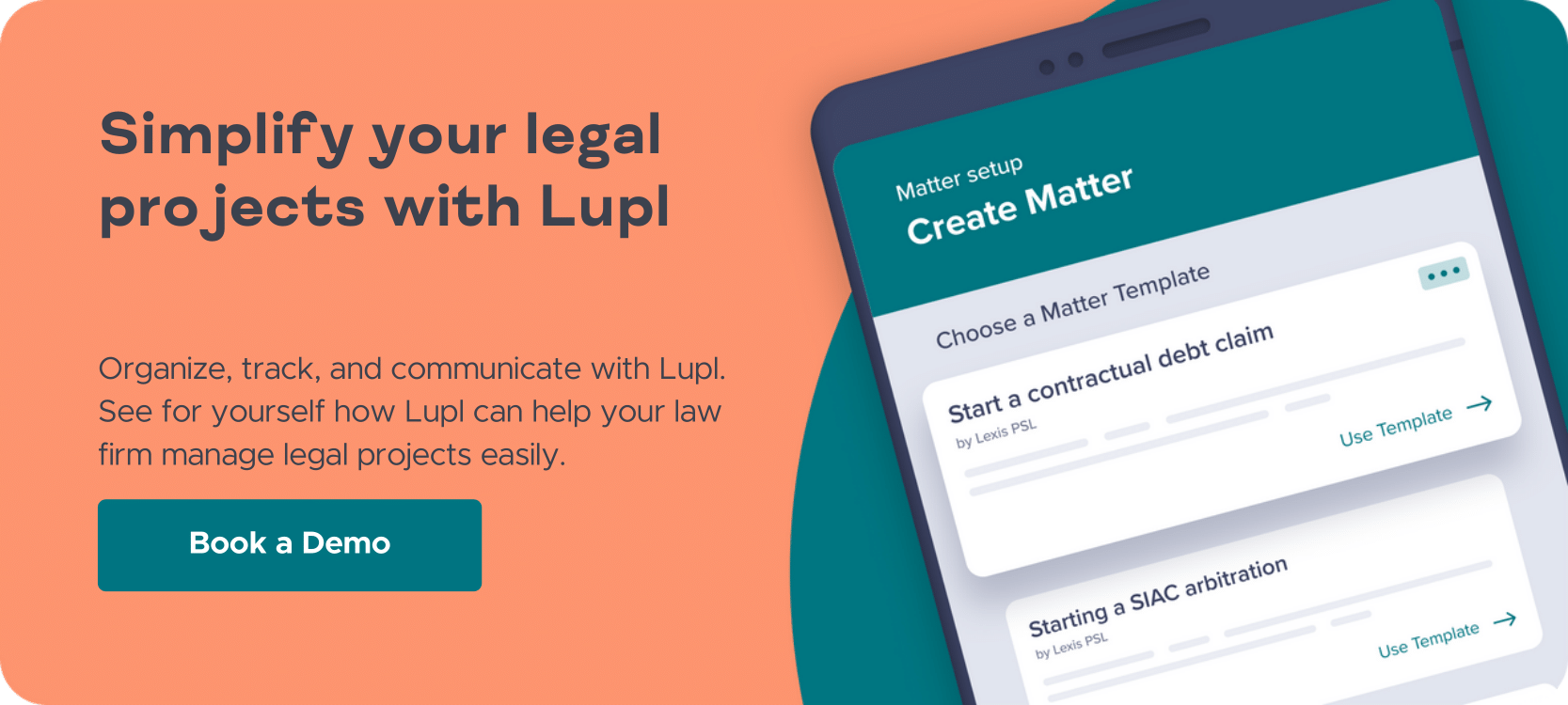5 Ways to Combat Law Firm Stress in 2023

Lawyers work hard. But for those in big law firms, many are working too hard. An astounding 92% of lawyers surveyed have experienced stress or burnout in their career, with a further 25% experiencing it every day.1
There’s nothing wrong with hard work. Big law is competitive, and that means putting in the hours to get to the top. But there is something wrong when lawyer burnout becomes almost part of the job description. And when nearly two-thirds of lawyers report that their job negatively impacts their mental health2, it’s clear that this problem is a) real and b) needs to change.
This isn’t just bad for the lawyer’s mental health and work-life balance, it’s also bad for business. The quality of work can slip, client expectations aren’t hit, and lawyers leave — not just the firm, but the industry. And law’s reputation as an exhausting, stressful industry increases.
The legal profession needs a plan of action. So in this blog, we’ll explore why big law is so stressful and how lawyers and law firms can help prevent burnout…
Why Big Law is Stressful
From dealing with sensitive information, managing complex matters and dealing with emotional situations with clients, lawyers in biglaw firms face stressful situations every day. This includes…
Multiple and demanding projects
Clients don’t wait around for other projects to be finished before they get in touch. Lawyers work on several cases, matters or projects all at once. And all of them matter. Lawyers have to keep on top of all of them, from their progress to the next steps.
Long hours
Junior lawyers at some law firms are working 14-hour days3. Big law attorneys can work up to 80-hour weeks. At this point, many law school graduates assume that the cost of a legal career is working long hours. Having to be ‘on’ so much of the time, whether working on billable hours or not, contributes to biglaw burnout.
Client demands (and client-facing roles)
When a client is paying top dollar for your legal services, ‘going above and beyond’ becomes par for the course. Client demands (within reason) have to be met — or it’s your firm’s reputation that’s taking a hit.
Plus, a lot of the time, law firm matters are dealing with high-stakes, emotionally charged subjects — which means dealing with emotionally charged clients.
Lack of control
Few things contribute more to high stress levels than the feeling of not being in control4 — of your work and, by extension, your time. So when it starts to feel like your work environment is controlling you and not the other way around, stress builds until it reaches burnout.

But law firm burnout isn’t inevitable
In big law firms in particular, stress has almost become the norm. Many lawyers might not even recognise they’re becoming burnt out until and their work (and life) comes screeching to a halt. And with around 70% of people surveyed experiencing burnout in the last year alone, this isn’t something that can be brushed under the carpet.
But changing firms or careers isn’t inevitable. There are things lawyers themselves and law firm higher-ups can do to help deal with stress. Changes are happening across the legal industry, and you can be a part of that change by bringing them to your team. For example…
1. Create a centralized place for collaboration
Often, legal processes are more complicated than they need to be. From managing projects, communicating with outside counsel, and sharing know-how and knowledge, it can be stressful just trying to get a question answered or a task completed.
Often, the culprit is technology. If in-house teams and outside counsel use different technology or aren’t on the same page when it comes to the matters they’re collaborating on, things can stutter to a halt before they’ve even got going.
Which gives us the first way to reduce law firm stress: matter templates. Matter templates are pre-built matters that let you store, edit and access all your key tasks, deadlines, documents, and information (in a word, everything) in one place. They let you:
- Get set up in seconds: Being able to get a matter up and running in seconds removes that level of stress when beginning a new matter from scratch.
- Use one central place: Once set up, the template provides one central place where everyone can contribute and collaborate. This helps break up silos, increase knowledge and know-how sharing and makes sure everyone’s on the same page.
- Assign tasks: By assigning tasks to people, you’ve got peace of mind it’s being worked on — and being able to see when something’s been updated means less chasing.
The stress involved in getting tasks done, and in project management, isn’t set in stone. Creating simplified processes using new legal tools helps smooth things over so they work how you want them to — and as they should. And when things work smoothly, you and your team have a lot less to stress about.
Pro Tip: Dealing with sensitive information every day, security can be another stressor for lawyers. Any collaborative legal tool should be able to integrate with the other tech colleagues use to reduce security vulnerabilities and be SOC2 accredited.
2. Set boundaries
Burnout benefits no one. Individual lawyer burnout, attorney burnout, maybe even entire law firm burnout doesn’t help clients, doesn’t help lawyers and doesn’t help the law firm environment. People’s mental health suffers, it’s harder to provide quality work for clients, and the legal industry’s reputation suffers.
Lawyers need to be able to hit the brakes when they feel stressed and can see burnout on the horizon. This means knowing your limits and, crucially, setting them out clearly — with clients, colleagues, managers and mentors. That way, everyone’s on the same page and when you’re working and when you’re not.
- Set regular check-ins: Request (and, if necessary, demand) regular check-ins with your manager so you can communicate your workload and stress levels.
- Communicate when and where you’re working from: Set your working location on your calendar. Create an out-of-office email when you’re not working. Put your working hours in your email signature. Set your boundaries clearly.
- Set time limits: Know when you should be starting and finishing work — and stick to it. You can even set time limits on your tech devices, so you know when you should be winding down.
3. Close the stress cycle
Everyone feels some stress. But, according to Drs. Amelia and Emily Nagoski, it’s about “how we deal with stress, not what causes it, that releases the stress, completes the cycle, and ultimately, keeps us from burning out.”5 So what can lawyers do right now, sitting at their desks, to try to release it?
Breathing
It sounds simple, and that’s because it is. But the evidence-based technique of regulating your breathing to help stay calm works — honestly. Concentrated breathing helps you down-regulate your stress response. Just try breathing in for a count of 5, holding your breath for 5, breathing out for a count of 10, and then pausing for another 5. Repeat that three times and see how you feel.
Positive social interaction
This sounds like a no-brainer. We’re designed to pick up on the feelings of our environment, so if our environment is stressful, we’ll feel stressed too. So when you can have casual and friendly interactions, your brain recognises that it’s a safe place which helps keep everything calm. By setting boundaries on your working hours, you have time to see that friend, do that cinema trip, or whichever social interaction you prefer.
Get affectionate
Maybe don’t go right up and hug your colleague without warning. But research suggests that hugging someone you love for 20 seconds, both standing, can lower your heart rate and blood pressure (both related to stress) and improve your mood.
Alongside making sure your physical health isn’t ignored with exercise, these strategies aren’t panaceas. But practicing mindfulness — being aware — of when you’re stressed, and doing small things to help is a good foundation to stress reduction.
4. Embrace legal tech…
Legal is behind the curve on tech — and high stress levels is one consequence of this. Tech isn’t there for the sake of it; it’s meant to make your job easier, but when only 12% of law firms consider themselves cloud-based it’s clear that legal sometimes isn’t making the most of even the most basic tech.6
You’re using tech already, that’s a given. But it’s probably not specifically designed for you. And that can cause stress when it’s meant to create simplicity. Big law stress is specific, so you need technology created by people who’ve experienced it, creating solutions tailored to the issues you deal with on a daily basis.
Lupl is this: legal tech created by lawyers for lawyers. From integrating the tools you use every day into Lupl (from WhatsApp to Zoom) to streamlining workflows, Lupl understands that simplifying processes reduces stress. Alongside this, Lupl also provides:
- Dashboards: Simple dashboards provide a bird’s eye view over your workload so lawyers can understand what they’re working on, who’s working on what, make sure everyone stays on track and not miss anything that your projects need — all at a glance.
- Live document editing: Sending things back and forth multiple times, probably over email once someone’s edited it? Stressful. Waiting to get that back, while a deadline gets closer? Stressful. It’s quicker and easier to edit documents live, keeping track of changes because everyone can see what’s happening, as it’s happening.
- Research pins: Lupl Pins is an extension that lets you “pin” anything (from research to client information) to a matter you’ve set up. No more copying and pasting research onto a document, and then pasting the link to that doc into your collaborative space. Keep it all together.
And, as an added bonus, embracing new legal tech means less email. 92% of employees show elevated blood pressure and heart rate when handling work emails.7 Less email = less stress.
5. …Including mobile (within limits)
Going mobile is great, but it can be a double-edged sword. On the one hand, it can really help with creating and maintaining a healthy work-life balance. You no longer need to always be at your desk, which means you don’t need to spend hours commuting every day, prolonging your working day. You can even finish off your work on the train, meaning you can leave work earlier and get home quicker.
But it can also mean it’s easier to stay working. When you’ve always got access to the office in your pocket, sometimes the office never goes away. This means you should set proper boundaries and put the mobile down. Time limits can be set on most phones and they’re an easy fix — so long as you don’t ignore them.
Lupl’s mobile app lets you work on the go, so you no longer need to be in the office five days (and who knows how many hours) a week. This gives you the flexibility, and time, to work from home or wherever you are. With mobile integration and cross-app interfaces, all your work is right there for you, all in one place. Just be sure to set those limits and put the phone down.
Simplifying law work lowers stress
Working hard is fine. In big law, it’s necessary. But with a quarter of lawyers experiencing stress or burnout every day, that’s not just unnecessary — it’s damaging. But that doesn’t mean it’s inevitable. We can take steps to close the stress cycle and keep burnout at bay on our own.
Fundamentally, it comes down to simplifying the way lawyers work. It doesn’t mean work demands will stop or that you’ll suddenly have fewer projects to work on. But it does mean that processes that are unnecessarily complex need to be simplified with technology built for legal teams.
As a tool created by lawyers who know about this all too well, Lupl is a tool redefining legal collaboration. One tool isn’t going to solve all your problems, right? Maybe not, but the right legal tool can act as a micro innovation that causes a macro impact.
With Lupl, you can get as much as 40% of your time back. Imagine what you could do with the equivalent of an extra two days, every week. To see for yourself how simplifying legal processes can reduce stress, book a demo today.
1 92% of lawyers have faced stress or burnout, study finds | Today’s Conveyancer
2 92% of lawyers have faced stress or burnout, study finds | Today’s Conveyancer
3 Revealed: The extreme working hours of big-paying US law firms in London – Legal Cheek
4 Self-Efficacy And The Perception Of Control In Stress Reduction – Mental Help
5 Feeling emotionally exhausted? 6 things you can do to release your stress |
More legal tech insights we think you'll love

Q2 2024 Product Update – New Features & Improvement
Lupl is the leading task and project management solution for...

How a team of trainee lawyers streamlined work handovers with Lupl
CMS trainees adopt Lupl's task management tools to enhance work...



